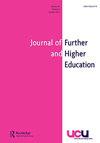The struggle to get a PhD: the collaborative autoethnographic accounts of two ‘journeymen’
IF 2.4
Q1 EDUCATION & EDUCATIONAL RESEARCH
引用次数: 0
Abstract
ABSTRACT The PhD is the ultimate indicator of academic excellence. The journey is familiar to most University academics and is a journey the majority have successfully completed. Yet, just as it is said history is written by the victors, so most accounts written about doing a PhD, are written by those who have succeeded, not by ‘journeymen’, such as the narrators of this account. There is a need for narrative accounts that both acknowledge the difficulty of the journey and also show how some candidates have battled, to achieve their PhDs. Such stories have the power to inspire those who may be struggling on their own PhD journeys. Academics can share these accounts with their own PhD students and thus hopefully improve completion rates and change practice. The authors of this narrative have adopted a collaborative autoethnographic approach to their PhD journeys. The parallel narratives are in four interdependent sections. The narratives start with both authors’ unsuccessful attempts to get a PhD and end with how they, after completing their PhDs, started collaborating on research. From the authors’ first attempts, their respective PhD journeys took 20 to 30 years to come to completion. The accounts show that personality features such as resilience, motivation and grit, as well as the appearance of supervisors and partners i.e. allies of help at the right time can make the difference between success and failure. Both, now in their sixties, they are looking forward to many more exciting years of joint research.获得博士学位的斗争:两位“熟练工人”的合作民族志描述
摘要博士学位是学术成就的终极指标。这段旅程对大多数大学学者来说都很熟悉,也是大多数人成功完成的旅程。然而,正如人们所说,历史是由胜利者写的,所以大多数关于攻读博士学位的叙述都是由那些成功的人写的,而不是由“熟练工人”写的,比如这篇叙述的叙述者。需要有叙述性的叙述,既要承认这段旅程的困难,也要展示一些候选人是如何为获得博士学位而奋斗的。这些故事有力量激励那些可能在自己的博士之旅中挣扎的人。学术界可以与自己的博士生分享这些账户,从而有望提高完成率并改变实践。这篇叙述的作者在他们的博士之旅中采用了一种合作的民族志方法。平行叙述分为四个相互依存的部分。故事从两位作者试图获得博士学位的失败开始,到他们在完成博士学位后如何开始合作研究结束。从作者的第一次尝试开始,他们各自的博士之旅花了20到30年的时间才完成。这些描述表明,性格特征,如韧性、动力和毅力,以及主管和合作伙伴(即在正确的时间提供帮助的盟友)的出现,可以决定成功与失败。两人都已经60多岁了,他们期待着更激动人心的几年联合研究。
本文章由计算机程序翻译,如有差异,请以英文原文为准。
求助全文
约1分钟内获得全文
求助全文
来源期刊

JOURNAL OF FURTHER AND HIGHER EDUCATION
EDUCATION & EDUCATIONAL RESEARCH-
CiteScore
5.20
自引率
4.30%
发文量
80
期刊介绍:
Journal of Further and Higher Education is an international, peer-reviewed journal publishing scholarly work that represents the whole field of post-16 education and training. The journal engages with a diverse range of topics within the field including management and administration, teacher education and training, curriculum, staff and institutional development, and teaching and learning strategies and processes. Through encouraging engagement with and around policy, contemporary pedagogic issues and professional concerns within different educational systems around the globe, Journal of Further and Higher Education is committed to promoting excellence by providing a forum for scholarly debate and evaluation. Articles that are accepted for publication probe and offer original insights in an accessible, succinct style, and debate and critique practice, research, theory. They offer informed perspectives on contextual and professional matters and critically examine the relationship between theory and practice across the spectrum of further and higher education.
 求助内容:
求助内容: 应助结果提醒方式:
应助结果提醒方式:


